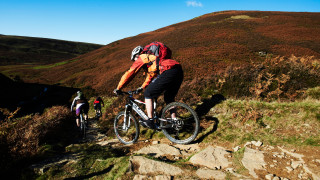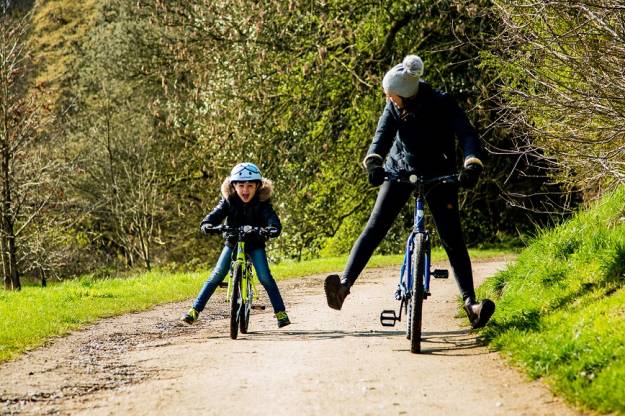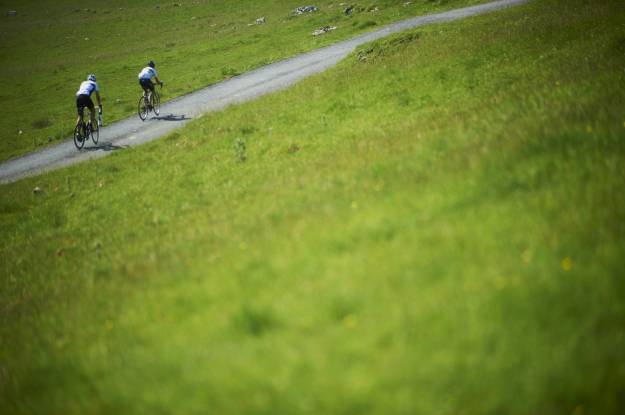Knowledge Level: Intermediate
The British Cycling Training Plans gives you the option to get out on your mountain bike but why should riding off-road be part of your training?
Why should I?
Boost top end strength and power
Off-road cycling gives a much more interval style workout than road cycling. This gives you a great top end hit and sudden steep climbs or slogs through mud are an alternative to gym sessions for building cycling specific strength and power.
Total body workout
Off-road cycling provides a far more total body workout than road cycling. You will be using your upper body to soak up lumps and bumps, lift your front wheel over trail obstacles and to gain extra power on steep climbs. Having to constantly shift your weight and centre of gravity to maintain traction and balance will challenge your trunk muscles in a way you will never experience on the road.
Pedaling efficiency
Riding off-road punishes choppy and heavy footed pedal mashing. Try to muscle up a loose or slippery climb and you will soon spin out, be off your bike and walking. To maintain traction you have to develop an even, circular and smooth pedaling style. You can then transfer this pedaling technique to your road cycling where it will result in far smoother, more economical and faster riding.
Bike handling
Hours spent road riding can result in a very static riding style and poor bike handling skills. Off-road cycling forces you to constantly change your riding position, learn cornering and braking skills and to become an all-round better bike rider. This translates into a faster all round riding, especially on more technical roads and a greater ability to deal with unexpected hazards such as potholes.
Escape winter roads
Icy, wet and dark winter conditions can make roads unpleasant and dangerous places to be. Getting off the road keeps you away from cars meaning you can concentrate 100% on your riding without having to worry about traffic and the salt on the road corroding your bike as you ride. It is also a lot more fun than toiling away on the turbo.
Fun
It is too easy when you are heading out for another epic training ride on winter roads to take your cycling far too seriously and forget that it is supposed to be fun. Embrace getting filthy, sliding around on mud and snow and probably taking the odd tumble. Get some decent lights and experience the thrill of night-time off-road riding. Even tame trails that you have ridden many times take on a whole new character in the dark.
Exploration
A mountain bike, gravel or cross bike lets you explore all of those back roads and green lanes that you have never dared to venture down on your road bike. Spend some time with a map, plot some routes with some likely looking tracks and you might unearth some hidden gems that you will be able to include in your road rides.
Are there any downsides?
Maintaining constant intensity
Although the stop and start interval nature of off-road biking can be a beneficial training stimulus, being able to maintain a constant intensity when riding is essential for road riding. Some mountain biking is great for the reasons listed above, but you also need to ensure you are putting in the road miles and turbo workouts too. The consistency of intensity you are able to maintain on the road is one of the main reasons why cross country racers spend a lot of their training time on the tarmac.
Recovery
Off-road biking is extremely hard on your body. The combination of sudden spikes of high power, constant shocks and vibrations and the higher total body demands mean that hard mountain biking will take more out of your body and require more recovery than an equivalent time spent riding on the road. This is another reason why cross country racers do most of their miles on the road. Use these techniques to maximise your recovery.
Risk of injury
Off-road cycling does carry a higher risk of injury than road cycling but, as crashes tend to be at slower speeds and don’t involve traffic, it is usually just a case of a few cuts and bruises. Always try to ride within your own technical ability and fitness and, if you have any doubt about your ability to ride a section of trail, walk it first. When descending, stay relaxed and never ride so fast that you feel as though you are out of control.
Cost
If you don’t already own a mountain bike, the expense of buying one might put you off. However you can get a good lightweight hard-tail (front suspension only) mountain bike for under £1K. You will get a higher spec and lighter hard-tail for your money compared to a full suspension bike and it will require less maintenance and will encourage the development of better bike handling skills.
A cyclo-cross bike is another option, allowing you to explore small lanes and, if you need a competitive challenge, take part in one the most fun and accessible forms of cycle sport. A dedicated cyclo-cross bike will have a fairly aggressive race geometry and may lack drillings for bottle cages and mudguards.
The third option is a gravel/adventure bike. Although looking seemingly like a cyclo-cross bike, their geometry tends to be more relaxed, making then more forgiving and suitable for longer rides. They also have drillings for bottle cages and mudguards. Some models also give you the option of running either 650b wheels with fatter tyres or 700c wheels with narrower tyres. This makes them extremely versatile bikes.
Most of your road cycling gear will cross over but you might need MTB specific shoes with recessed cleats for unavoidable walking sections of trail and compatible pedals.
Off road cycling, especially in the winter, is hard on bikes and components so good maintenance and cleaning is a necessity to avoid costly repair bills.
Where?
In England and Wales, you have the right to ride on the following public rights of way:
- Bridleways
- Byways Open to All Traffic
- Restricted Byways
Some rights of way have special agreements in place. An example is Snowdon, on which certain routes up the moutain are open to cyclists only at specfic times of day and of the year. If you have any doubts about your planned route, check with a local contact such as a cycle shop.
You may also ride on the following:
- ‘Routes with other public access’ – the Ordnance Survey term for ‘white roads’ or ‘green lanes’
- Unsurfaced Roads
- Forestry Commission stone tracks
- Some unsurfaced Forestry Commission tracks
- Forestry Commission mountain bike trails
- Cyclepaths and cycletracks
- Canal Towpaths
In Scotland, the Land Reform (Scotland) Act 2003 gave some of the best access rights in the world. You have the right to be on most land and inland water for recreation, education and going from place to place, providing you act responsibly. The Scottish Outdoor Access Code gives you all of the information you need to know about access for mountain biking in Scotland.
Mountain biking does open up the possibility of riding and exploring some truly stunning and genuinely wild areas. There are also now a multitude of trail centres offering purpose built and way-marked trails along with cafés, bike washers and even showers.
Technique
As well as requiring great fitness, maintaining balance, traction and momentum on the trail takes considerable skill and technique. Even if you are a strong road cyclist, just trying to muscle through simply won’t work. Spend some time learning key off-road techniques and you will ride faster and more efficiently. There is plenty of instructional written and video content for mountain biking and cyclocross technique on the website.
Cyclo-cross racing
No article on off-road riding would be complete without a mention of cyclo-cross racing. Cyclo-cross is one of the most accessible forms of cycle sport with many races offering on the line entry and allowing you to take part on a mountain bike. With races only typically lasting 40-60 minutes, around a short lap course and held in parkland locations, it is a convenient and fun way to get a competitive fix, build bike handling skills and get a great workout that doesn’t take up a huge chunk of your weekend. If you have got reasonable fitness from summer sportives and own a mountain bike, we strongly recommend pencilling in a few races during the winter but, be warned, it is highly addictive.












